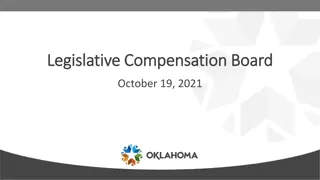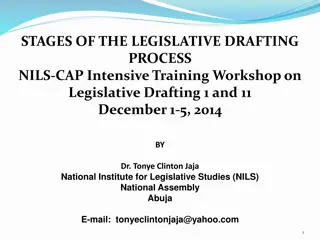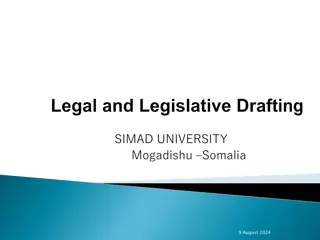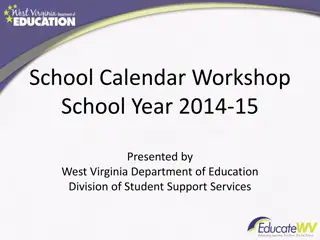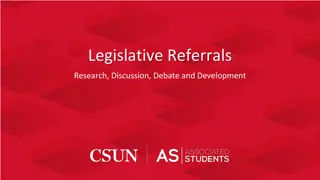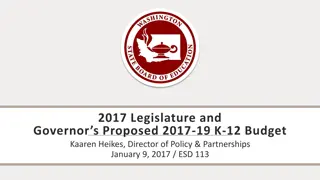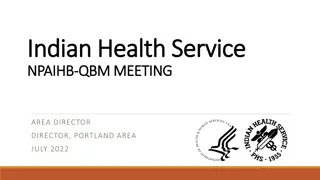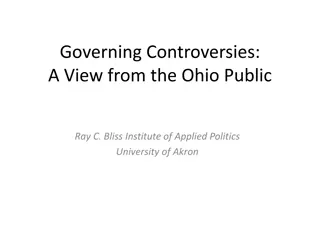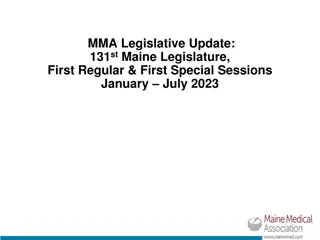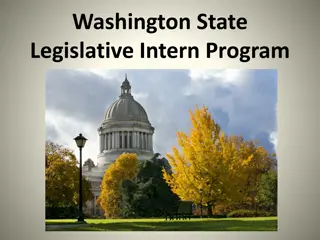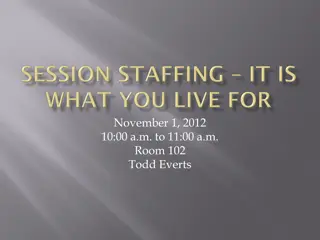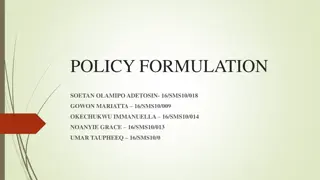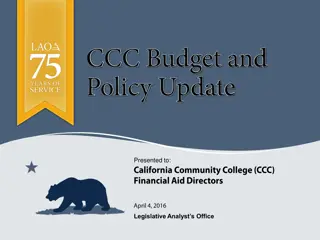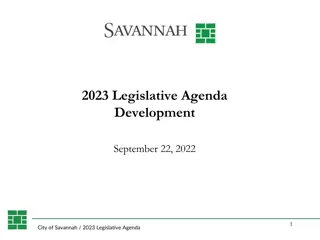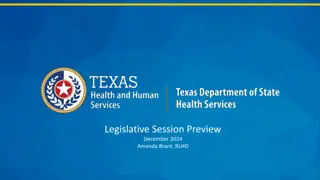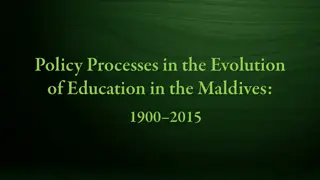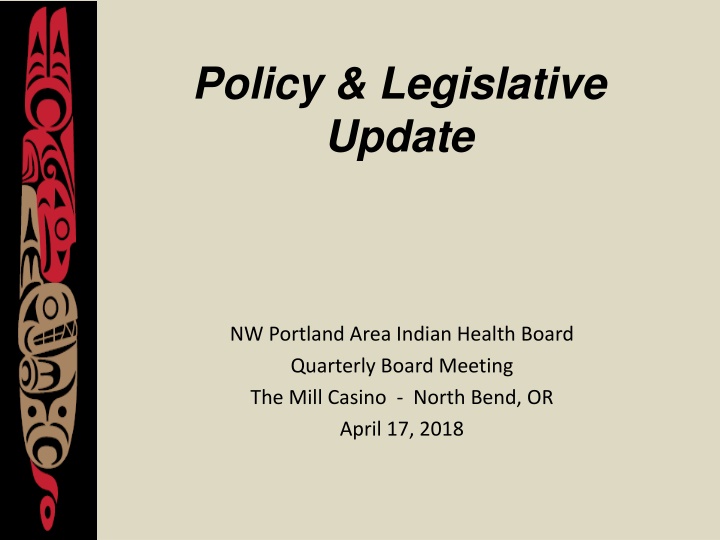
Indian Health Board Legislative Update and Appropriations Overview
Stay informed about the latest policy and legislative updates from the NW Portland Area Indian Health Board's quarterly meeting. Get insights into key legislation in the 115th Congress, including the Bipartisan Budget Act of 2018 and the Consolidated Appropriations Act, 2018. Discover the ongoing efforts to stabilize the individual insurance market and address addiction and recovery programs for tribal communities. Gain valuable information on federal and state policies impacting Indian health services. Explore the significant appropriations increases for Indian Health Service facilities and programs in the Omnibus FY 2018. Keep up-to-date with important healthcare legislation affecting Native American communities.
Download Presentation

Please find below an Image/Link to download the presentation.
The content on the website is provided AS IS for your information and personal use only. It may not be sold, licensed, or shared on other websites without obtaining consent from the author. If you encounter any issues during the download, it is possible that the publisher has removed the file from their server.
You are allowed to download the files provided on this website for personal or commercial use, subject to the condition that they are used lawfully. All files are the property of their respective owners.
The content on the website is provided AS IS for your information and personal use only. It may not be sold, licensed, or shared on other websites without obtaining consent from the author.
E N D
Presentation Transcript
Policy & Legislative Update NW Portland Area Indian Health Board Quarterly Board Meeting The Mill Casino - North Bend, OR April 17, 2018
Report Overview Legislation in 115thCongress 1. 2. FY 2019 and FY 2020 Appropriations 3. Current & Pending Federal Policies 4. Current & Pending State Policies 5. Upcoming National/Regional Meetings
Legislation in 115th Congress 3
Legislation in 115th Congress Ongoing: Efforts to Stabilize the Individual Insurance Market (no slide) Bipartisan Budget Act of 2018 (H.R. 1892) Consolidated Appropriations Act, 2018 ( Omnibus ) (H.R. 1625) The Mitigating METH Act (S. 2270) The Tribal Addiction and Recovery Act (H.R. 5140) Comprehensive Addiction and Recovery Act 2.0 (CARA) (S. 2456) The Native Behavioral Health Access Improvement Act of 2018 (S.2545) The PROGRESS for Indian Tribes Act (S.2515) Restoring Accountability in the Indian Health Service Act of 2017 (S.1250) VA Legislation (H.R. 4242 & S. 2193)
Bipartisan Budget Act of 2018 (H.R.1892) Introduced by Rep. John Larson (D-CT-1) on 4/4/17 $6 billion over 2 years for the opioid crisis. SDPI extended for 2 years with $150 million for FY 2018 and FY 2019. Community Health Centers extended for 2 years with $3.8 billion in FY 2018 and $4 billion for FY 2019. CHIP extended for an additional 4 years, through FY 2027. Maternal, Infant, and Early Childhood Home Visiting Program extended through FY 2022 ($400 million annually). Became Public Law No. 115-123 on 2/9/18
Consolidated Appropriations Act, 2018 ( Omnibus ) (H.R. 1625) Congress passed the FY 2018 Omnibus on March 23, 2018. $1.3 trillion in discretionary spending $88.1 billion (10.1 billion increase) for HHS $5.5 billion (10% increase) for IHS Omnibus allocates the following for IHS: $3.9 billion for services $867 million for facilities $718 million for Contract Support Costs
Omnibus FY 2018 IHS Appropriations Increases above FY 2017 enacted levels: Hospitals and Clinics: $110M/$36M for current services Indian Health Care Improvement Fund: $72M Accreditation Emergencies: $58M Domestic Violence Prevention: $4M Prescription Drug Monitoring Program: $1M Alcohol and Substance Abuse Programs: $8M for current services plus Mental Health: $2.8M for current services Dental Health: $5.8M for current services Purchased/Referred Care: $32M Health Care Facilities Construction: $125.9M Small Ambulatory Program: $10M Maintenance and Improvement: $91.7M Sanitation Facilities Construction: $90.3M
Omnibus FY 2018 Other IHS Authorities and Reports to Congress IHS encouraged to transfer certain funds (e.g. behavioral health award programs) through ISDEAA compacts and contracts rather than grants. New housing subsidy authority for civilian medical personnel serving in IHS-operated hospitals (funding would have to be identified) Report on Patient Wait Times. Report on patient population growth over the past 10 years and the funding sources used to provide these medical services. Report required on personnel authorities between the VA and IHS (Title 38)
Omnibus FY 2018 Other HHS Appropriations Opioid Crisis $50 million Tribal set aside (out of $1 billion) for Tribes to access the SAMHSA State Targeted Response (STR) to Opioid Crisis Grants $5 million for Tribal set aside Medication Assisted Treatment programs at SAMHSA Good Health and Wellness in Indian Country (CDC):$16M Tribal Behavioral Health Grants (SAMHSA): $15M Zero Suicide Initiative for American Indians and Alaska Natives (SAMHSA): $2M Secretary s Minority AIDS Initiative Fund: $54M
The Mitigating METH Act (S. 2270) Introduced by Sen. Steve Daines (R-MT) on 12/21/17 with co-sponsors Sen. Jeff Merkley (D-OR) and others. Amends the 21st Century Act to include funding for tribes for opioid prevention and response. Authorizes a tribe or state to use grants for prevention and treatment of substances, including methamphetamines, if use of substances is determined by a state or tribe to have a substantial public impact on the state or tribe. Provides $25 million directly to tribes. Referred to HELP Committee on 12/21/17.
The Tribal Addiction and Recovery Act (TARA) (H.R. 5140) Introduced by Rep. Markwayne Mullin (R-OK-2) on 3/1/2018 Allow Tribes to receive opioid prevention funding directly from the federal government. Clarifies that funds can be used to treat opioids and other addictive substances, such as alcohol, methamphetamine or heroin, including by providing mental health services. This bill is very similar to S. 2270 introduced by Senator Steve Daines (R-MT) in December 2017. Referred to the House Energy and Commerce Committee Subcommittee on Health on 3/2/18
Comprehensive Addiction and Recovery Act 2.0 (CARA) (S. 2456) Introduced by Sen. Rob Portman (R-OH) and Sen. Mike Rounds (R-SD) on 2/3/17; 10 co-sponsors-bipartisan support. A bill to reauthorize and expand the Comprehensive Addiction and Recovery Act of 2016. Allows states to put in place a 3 day limit on first time opioid prescriptions. Allows tribes to apply to receive $300,000,000 for evidence- based prescription opioid and heroin treatment and intervention demonstrations for FY 2019-2023. Allows states to raise patient caps under certain conditions for Medication-Assisted Treatment for recovery from addiction. Requires the use of prescription drug monitoring programs. Increases civil and criminal penalties for opioid manufacturers. Committee on Judiciary Subcommittee on Crime and Terrorism Hearings held, 4/11/18.
Opioid Response Enhancement Act (S.2437) Introduced by Sen. Tammy Baldwin (D-WI) on 2/15/18; 15 co-sponsors. Amends the 21st Century Cures Act to allow tribal entities to be eligible for State Targeted Opioid Response (STR) Grants Provides a 10% set aside for tribal entities. Allows states and tribes to use STR grant program funding to address other substance abuse issues. Establishes a $2 billion STR Enhancement Grant over 5 years for at least 10 states and tribes with high needs. Referred to HELP Committee on 2/15/18.
Other Opioid Hearings SCIA Committee held an Opioid Hearing on 3/14/18 (available online) Port Gamble S Klallam testified NPAIHB submitted testimony for the record.
The Native Behavioral Health Access Improvement Act of 2018 (S.2545) Introduced by Sen. Tina Smith (D-MN) on 3/14/2018. Authorizes a special behavioral health program for Indians. Appropriates $150 million each year for FY 2018-2022 for providing services for prevention and treatment of mental health and substance use disorders. Establishes a technical assistance center. Referred to the Senate Committee on Indian Affairs on 3/14/18.
The Practical Reforms and Other Goals to Reinforce the Effectiveness of Self-Governance and Self-Determination (PROGRESS) for Indian Tribes Act (S.2515) Introduced by Sen. John Hoeven (R-ND) on 3/7/18; 5 co-sponsors. Amends ISDEAA to provide further self- governance to Indian tribes by streamlining the Interior Department's self-governance process and providing tribes with greater flexibility to administer federal programs. SCIA approved without amendment on 4/11/18.
Restoring Accountability in the Indian Health Service Act of 2017 (S. 1250 & H.R. 2662) Senate and House bills Introduced by Sen. John Barasso (R-WY) and Rep. Kristi Noem (R-SD) on 5/25/17, respectively. This bill attempts to address quality of care issues occurring at some IHS-operated hospitals in the Great Plains Area and elsewhere. 5/25/17: Referred to Senate and House Committees. S. 1250- 6/13/17: Senate hearings were held. H.R. 2662- 6/21/17: House Subcommittee hearing was held; Chairman Andy Joseph, Jr. testified. Amendment Changes: (1) Self-governance exemption clarification (2) Indian preference waived at the request of a tribe (3) IHS Tribal Consultation policy (4) IHS employment provisions re-written. Markup by Senate Committee on Indian Affairs scheduled for 4/11/18
VA Health Legislation H.R. 4242 - VA Care in the Community Act introduced on November 3, passed Committee on December 19. Contains exemption for Tribal and federal providers on rates to negotiate higher rates rather than value-based or Medicare rates Allows IHS as an in-network provider and Any health care provider not otherwise covered under any of subparagraphs (A) 5 through (F) that meets criteria established by the Secretary for purposes of such section. S. 2193 Caring for our Veterans Act introduced and passed out of committee on December 5. Similar provisions to house on Tribal and federal in network providers Does not include exempt from value-based reimbursement, or Medicare rates Supports MOUs with Tribes and IHS Increases number of GME spots, allows IHS and Tribes to participate Trying to include language emphasizing PRC could be repaid through MOU arrangements.
Other Legislation in 115th Congress Still Pending Special Diabetes Program for Indians Reauthorization Act of 2017 (S.747 & H.R. 2545) Native Health and Wellness Act of 2017 (H.R. 3706) Native Health Access Improvement Act of 2017 (H.R. 3704) Native American Suicide Prevention Act of 2017 (H.R. 3473) Drug Free Indian Health Service Act of 2017 (H.R. 3096) Independent Outside Audit of the Indian Health Service Act of 2017 (S.465) Tribal Veterans Health Care Enhancement Act (S.304) IHS Advanced Appropriations Act of 2017 (H.R. 235)
FY 2019 and FY 2020 Appropriations 20
FY 2019 IHS Budget/Presidents Proposal President s Budget Proposal Summary was released on February 12. Proposes $5.4 billion (includes SDPI) for IHS. Tribal Budget Formulation Workgroup recommended $6.4 billion for FY 2019. Increases funding for Hospital and Clinic Services ($2.1 billion); PRC funding ($955 million); and Mental Health, Alcohol and Substance Abuse Programs ($340 million) Moves SDPI (and certain other health programs) from mandatory to discretionary funding. Eliminates the IHS Community Health Representative program, the Health Education program and Tribal Management Grant programs. Congressional Justification: direct clinical services and staffing for newly constructed facilities are prioritized
FY 2019 HHS Budget/Presidents Proposal (cont.) Eliminates $3.6 trillion from domestic spending programs (Medicare, Medicaid, public health and social safety net programs) Federal Medicaid expansion funding would be replaced with a block grant. ACA Exchanges premium subsidies would be eliminated. $272 billion would be cut from Medicare over 10 years. $10 billion investment to treat the opioid epidemic, including $150 million set-aside for tribes.
FY 2020 IHS Budget National Tribal Budget Formulation Workgroup co-chairs presented the recommendations for FY 2020 at the HHS Annual Tribal Consultation in D.C. on March 1 and to HHS Budget Council for the Tribal Budget Formulation in D.C. on April 11. Recommends over $7 billion for FY 2020 (36% increase over FY 2017 enacted level). Recommends $36.83 billion for tribal needs based budget to be implemented over 12 year period.
Current & Pending Federal Policies 24
Surgeon General Advisory on Naloxone On April 5, the Surgeon General recommended that more individuals besides first responders, carry naloxone. Naloxone, an FDA-approved medication that can be delivered via nasal mist or injection can temporarily suspend the effects of the overdose until emergency responders arrive. The Surgeon General advises patients and the public to: Talk with a doctor or pharmacist about obtaining naloxone; Learn the signs of opioid overdose; and Get trained to administer naloxone.
IHS Indian Health Care Improvement Fund (IHCIF) Dear Tribal Leader Letter (DTLL) on 11/13/17 Establishment of IHS/Tribal IHCIF workgroup. Workgroup will assess the impact of past allocations to address inequities; effects of the current health care environment; and make recommendations that will be sent out for tribal consultation. Workgroups on User Population v. Service Population, Benchmark factors, Alternate Resources and Access to Care. Three face-to-face workgroup meetings have taken place; last one May 17-18.
IHS Community Health Aide Program (CHAP) DTLL to be released soon. CHAP Workgroup meeting March 21-22 in Phoenix, AZ. IHS Aim- by end of calendar year 2020, a national CHAP will be established and measured by a TAG.
IHS Contract Support Costs Policy Update DTLL on 12/21/2017 Temporary rescission of Alternative Methods for Calculating Indirect Costs Associated with Recurring Service Unit Shares, referred to as the 97/3 split. IHS CSC Workgroup met March 6-7, 2018 in Albuquerque, NM. IHS and Tribes negotiated proposed changes to Section 6-3.2E(3) of the IHS Manual that will go out for Tribal Consultation.
IHS Health Information Technology Issued a request for information (RFI) for vendors on 12/20/2017. IHS received over 40 responses regarding: Services for Modernization of current platform New Platform Services for Transition Goal: to augment, modernize, or replace RPMS legacy health IT systems. Hoping to begin implementation of a transition by FY 2020. IHS ISAC workgroup recommended moving to a commercial off-the-shelf system and include information IT staffing in the IHS Strategic Plan. IHS ISAC meeting was held March 14-15, 2018 in Phoenix, AZ.
IHS Strategic Plan 2018-2022 DTLL on 11/28/17. Comments were due on 10/31/17; NPAIHB submitted comments. IHS received 137 comments. Established an IHS Strategic Planning workgroup to review comments and finalize a draft Strategic Plan, including, mission, vision, goals, objectives, strategies, and measures. IHS will initiate a 30-day public comment period for tribes to comment on the draft Strategic plan, which is anticipated to be finished by early May. IHS will hold an All Tribes Call to share updates on the draft strategic plan during the 30-day comment period. IHS expects the final IHS Strategic Plan to be completed and published by late summer.
IHS CHEF Proposed rule issued on 1/26/16 (81 Fed. Reg. 4239 44). Added tribal resources to the list of alternate resources. No tribal consultation on this rule before it was issued. In 2016, several tribal consultations took place. Payer of last resort case of Redding Rancheria v. Burwell, No. 15-152(DDC) has delayed IHS from issuing a final rule. Status: court case still pending.
CMS 4 Walls Limitation CMS determined that If a Tribal facility is enrolled in the state Medicaid program as a provider of clinical services under 42 CFR 440.90, the Tribal facility may not bill for services furnished by a non-Tribal provider or Tribal employee at the facility rate for services that are provided outside of the facility. Per CMS, under FQHC designation there is no requirement that the services be provided within the 4 walls. Section 1905 of the SSA recognizes outpatient Tribal clinics as FQHCs. CMS FAQ released January 18, 2017. Effective Date: January 30, 2021. Tribes are waiting for CMS Guidance currently under interval review.
Current & Pending State Policies 33
Idaho Idaho legislature adjourned before consideration of 1332/1115 waiver with work requirements. CMS responded to the Idaho DOI Bulletin 18-01 and Gov. Otter on 3/8/2018 stating that the federal government could not allow for insurance plans to be sold that do not adhere to the ACA s protections for preexisting conditions to be sold. However, CMS has a Short-Term Limited Duration Proposed Rule (comments due April 23) that could allow for states to have more flexibility for short-term limited duration insurance to not be included in the definition of individual health insurance coverage. SPA to restore access to preventative and restorative dental benefit services for adults covered by Idaho Medicaid. SPAs to streamline the process for children within the Idaho Medicaid program to receive early intervention services in coordination with the Idaho Infant Toddler Program (ITP).
Oregon Renewal of 1915(b)(4) selective contracting waiver for Aging and People with Disabilities. Tribal consultation on 4/11/2018. 1115(a) SUD Demonstration Waiver in discussion with Tribes. Meeting with state currently being scheduled. SPA for preventative dental services in I/T/U clinics for new Medicaid dental clients to receive supplemental Medicaid incentive payments. OHA has made $278,700 available to the 9 tribes and NARA for Year 1 of the SAMHSA State Targeted Response (STR) grant money to be used for prevention and treatment activities. 100% FMAP Care Coordination Agreements and Shared Savings.
Washington No response yet from CMS/HCA on DHAT SPA following an inquiry from CMS for additional information (SPA 17-0027) On 100% FMAP-4 walls issue, Tribes received an answer to their last pending implementation question. MCO Payment of Encounter Rate Programs being moved from DSHS to HCA: consultation and communication protocols; government-to-government planning; consolidated contracting with tribes; and intergovernmental transfer for substance use disorder. Programs being moved from DSHA to DOH: mental health licensing/certification and tribal attestation. House Bill 1388 (Agency Behavioral Health Integration) was enacted during 2018 legislative session. State discussed bill on April 5 HCA tribal call.
National/Regional Meetings 37
April 2018-June 2018 TSGAC Annual Conference, April 22-27: Albuquerque, NM CSC Workgroup Meeting, April 23 noon-1:30pm National Budget Formulation Workgroup Meeting, April 25 DSTAC Meeting, April 30-May 1: Albuquerque, NM HHS Region 10 1:1 Meetings, May 1: Shelton, WA HHS Region Tribal Caucus, May 1, 4pm-5pm: Shelton, WA HHS Region 10 Annual Tribal Consultation, May 2: Shelton, WA STAC Meeting, May 9-10: Washington, D.C. IHCIF Meeting, May 16-17: Denver, CO NIHB Annual National Tribal Public Health Summit, May 20-24: Prior Lake, MN ATNI Mid Year Conference, May 21-24: Toppenish, WA NCAI 2018 Mid-Year Conference & Marketplace, June 3-6: Kansas City, MO MMPC Strategy Meeting, June 11-13: Tulsa, OK


